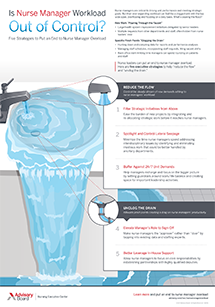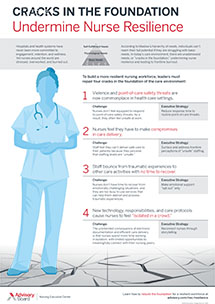Auto logout in seconds.
Continue LogoutEditor's note: This popular story from the Daily Briefing's archives was republished on March 17, 2020.
Nurses often feel exhausted after a long shift, and a new study suggests that this feeling isn't just a consequence of hard physical labor—a finding that could help explain why desk workers also feel weary after a long day at work, Brian Resnick reports for Vox.
Infographic: The 4 foundational cracks that are undermining your nurses’ resilience
The fatigue hypotheses
Psychologists are still trying to figure out all of the reasons why knowledge workers tend to fall victim to mental fatigue. But, according to Resnick, there are two main hypotheses behind why we get tired from work—even when we're not in physically demanding jobs.
The first is called ego depletion. The theory goes that we draw on a limited amount of mental energy throughout the day, and as that energy depletes, we get tired and feel fatigued. However, a few studies have suggested that the theory, although once popular, may not hold up to experimental testing.
The other hypothesis is that we run out of motivation. As we work on a task, we eventually lose focus or interest and become less motivated to finish the task. As a result, we become drawn to things that we want to do instead—and some researchers suspect that the effort involved in keeping ourselves on task could cause fatigue.
What's driving nurses (and others) to fatigue?
A recent study sought to explore that second theory among 100 nurses in the United Kingdom. Researchers monitored the nurses over the course of two 12-hour shifts, asking about their fatigue levels at various intervals and tracking the nurses' physical activity via wearable devices.
The researchers found the more hours the nurses worked, the more fatigued they felt. But to the researchers' surprise, there was no correlation between physical activity and fatigue.
Derek Johnston, lead author on the study and a psychologist at Aberdeen University, explained, "In some people, physical activity is fatiguing. But in other people, it is energizing."
Instead, the researchers found the nurses who were least likely to feel fatigued were the ones who reported feeling most in control of their work and most rewarded by their work, Resnick writes. As a result, the researchers hypothesized these nurses may have felt more heavily motivated, which could mean they needed to use less mental energy to stay on task.
Michael Inzlicht, a psychologist at the University of Toronto who led a separate study into fatigue, hypothesized that the number of distractions one must face can impact one's level of motivation. He explained, "If you're typing at work, and if you're anything like me, you got a few browsers open, you got Twitter open." He continued, "These lead us down these rabbit holes that lead us to temptations," which can make us less motivated to work and, as a result, fatigued.
Inzlicht said this hypothesis makes evolutionary sense. "As an organism, we need to meet multiple goals to survive," he said. "Because these multiple goals compete with one another [for our time], we need a mechanism in place that signals, 'Hey, stop doing that thing and do something else.'" That mechanism could be fatigue, Inzlicht suggested (Resnick, Vox, 9/5).
The 4 foundational cracks that are undermining your nurses’ resilience
Check out our infographic to learn which four cracks in the care environment leaders must repair to rebuild the foundation for a resilient workforce.
Don't miss out on the latest Advisory Board insights
Create your free account to access 1 resource, including the latest research and webinars.
Want access without creating an account?
You have 1 free members-only resource remaining this month.
1 free members-only resources remaining
1 free members-only resources remaining
You've reached your limit of free insights
Become a member to access all of Advisory Board's resources, events, and experts
Never miss out on the latest innovative health care content tailored to you.
Benefits include:
You've reached your limit of free insights
Become a member to access all of Advisory Board's resources, events, and experts
Never miss out on the latest innovative health care content tailored to you.
Benefits include:
This content is available through your Curated Research partnership with Advisory Board. Click on ‘view this resource’ to read the full piece
Email ask@advisory.com to learn more
Click on ‘Become a Member’ to learn about the benefits of a Full-Access partnership with Advisory Board
Never miss out on the latest innovative health care content tailored to you.
Benefits Include:
This is for members only. Learn more.
Click on ‘Become a Member’ to learn about the benefits of a Full-Access partnership with Advisory Board
Never miss out on the latest innovative health care content tailored to you.


